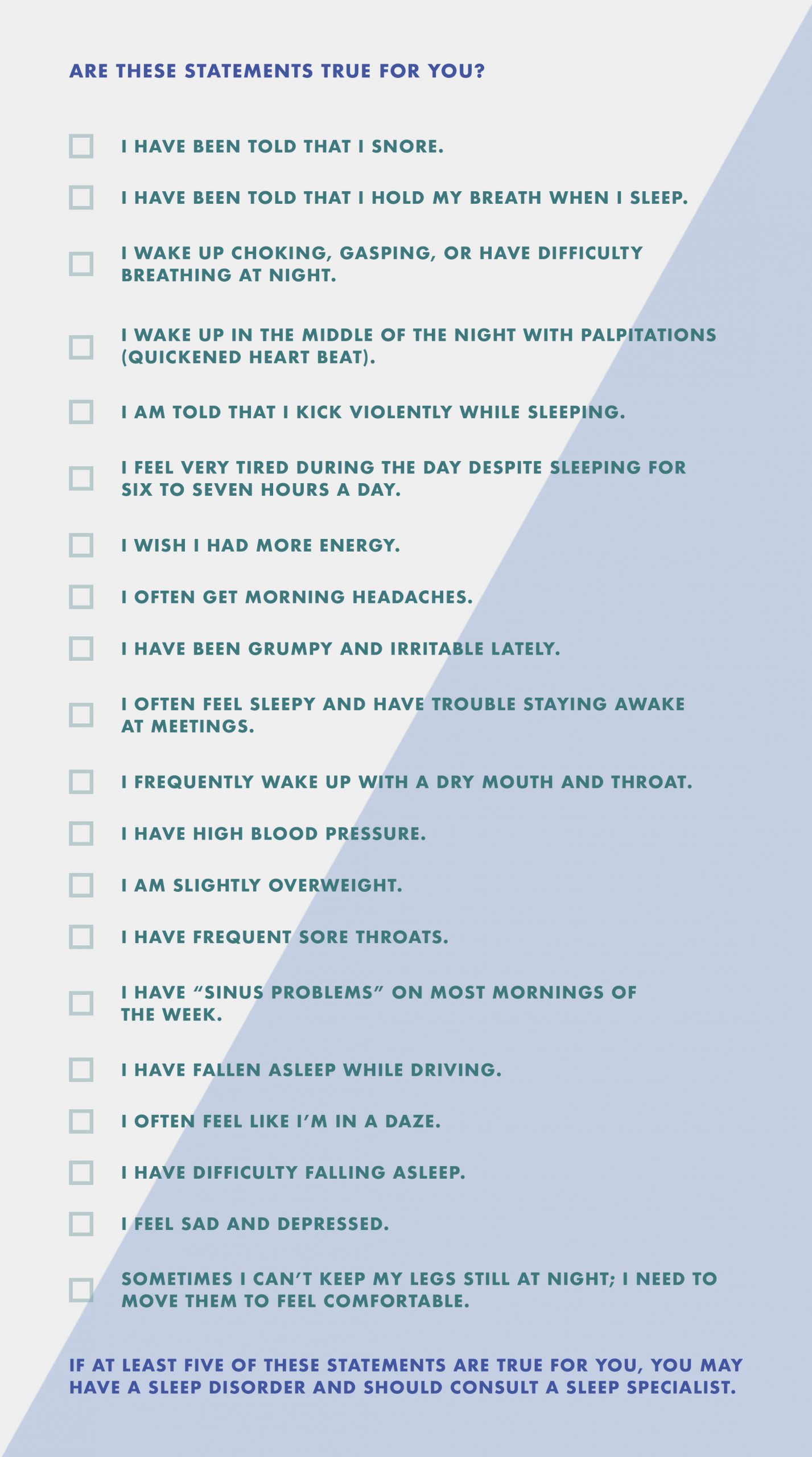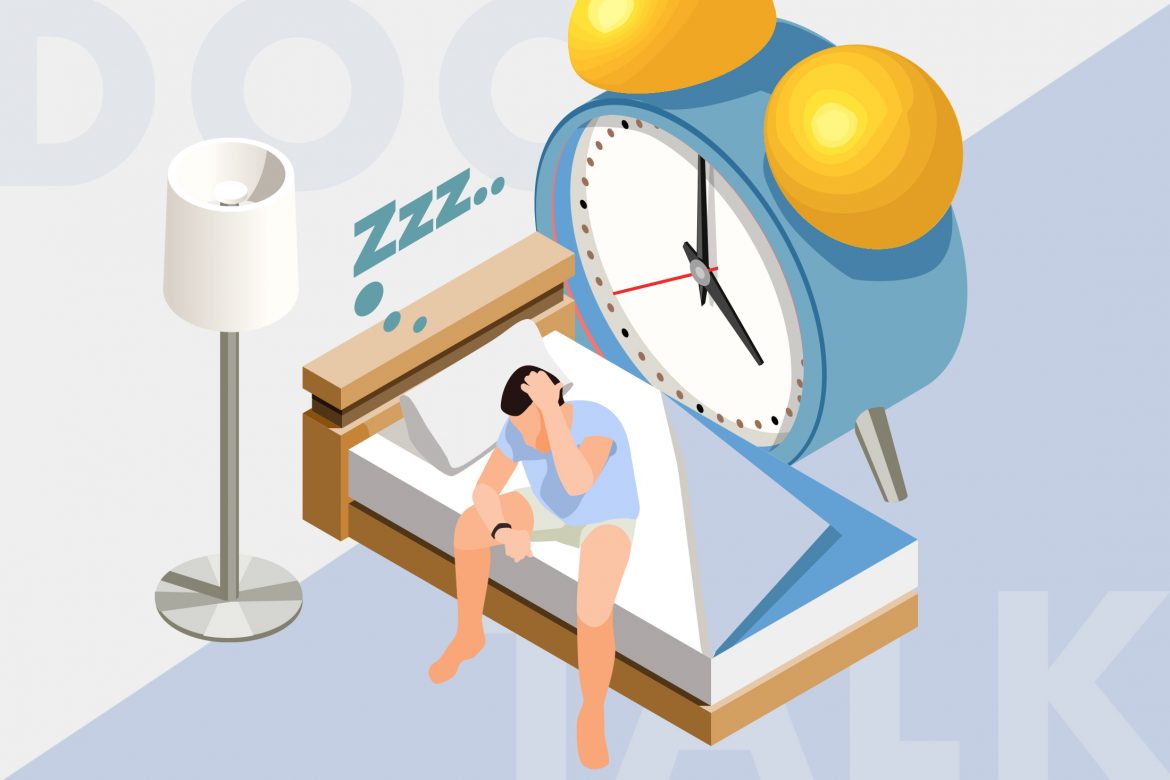Having trouble falling asleep is not the only red flag of sleep disorders. Here are some warning signs to look out for.
This article is written in consultation with Dr. Kenny Pang.
Humans spend about a third of their lifetimes sleeping, and yet so many of us take sleep for granted. Sleep is not only a time for the body to rest, but is also essential for our development, energy conservation, brain waste clearance, and tuning of immune responses, among other important vital functions. Sleep deprivation diminishes our ability to think clearly and react quickly – in driving simulations, accidents occur more frequently as a person gets fewer hours of sleep. Studies have also found links between insufficient sleep and the development of various diseases, from diabetes to depression and several cancers. Sleep is too important to skimp on, and sleep problems should definitely not be ignored. Here are some signs that spell trouble.

The most common complaint about sleep, insomnia means different things to different people. Some find it difficult to fall asleep. Others wake many times a night or too early in the morning – and have trouble falling back into slumber. Whichever the case, the poor sleep is really getting to you.
Insomnia is linked to various medical, psychiatric, and sleep disorders. Short-term insomnia, for instance, could be triggered by the environment, stress (emotional and mental), poor sleeping habits, or even your diet. In more serious cases, insomnia can persist longer for a few months. Possible causes include medical disorders such as arthritis, chronic fatigue syndrome, and cancer; neurologic disorders such as Parkinson’s disease; and most commonly, psychiatric disorders such as depression and anxiety. That’s why it is important that you work with a specialist to get to the root of your sleeplessness.

Contrary to popular belief, snoring does not mean that you are in a deep, restorative sleep. It is actually a form of sleep-disordered breathing. Caused by the vibration of tissues in the mouth and throat, snoring happens when there is an increased resistance to the inflow of air through the upper airways as you breathe. Some people are more prone to snoring because the size and shape of these tissues are more likely to obstruct their upper airway during sleep. People with a blocked or stuffy nose also have a crowded upper airway with little space for airflow.
While light, infrequent snoring is generally harmless, loud frequent snoring is the most common symptom for obstructive sleep apnoea, a sleep disorder that is due to upper airway collapse and stoppages in breathing with low oxygen intake at night. People with sleep apnoea may actually stop breathing very often at night. Left untreated, obstructive sleep apnoea is a dangerous condition that not only affects one’s energy level and daily functioning but also increases the risk of high blood pressure, heart attack, stroke, and even sudden death.
Not all snorers have sleep apnoea, but snorers with other symptoms like excessive daytime sleepiness, choking or gasping during sleep, and high blood pressure are significantly more likely to have the condition.

First, check your bedtime: People who get enough sleep should feel rested. As a general guide, children (aged 5 to 12) need about 9-11 hours of sleep while teenagers need about 9-10, and adults, about 7-8.
Still not feeling refreshed in the morning despite clocking many hours of zzzs each night? If you’ve ruled out possible short-term causes, like a recent change or stressful event in your life, you may have a disorder that is affecting the quality of your sleep. This can range from nasal allergies to sleep disorders like obstructive sleep apnoea, restless leg syndrome, and sleep bruxism (teeth grinding). Consider keeping a sleep diary (noting information such as the time you go to bed and rise, time taken to fall asleep, and medication taken, if any) so that you can have a more detailed discussion with your doctor.

Do you often experience morning headaches and/or wake up with a dry mouth and sore throat? These may be tell-tale signs that you have a sleep problem. People with sleep apnoea tend to suffer morning headaches because their oxygen intake repeatedly dips as they sleep. Morning headaches could also point to sleep bruxism, where you clench or grind your teeth as you sleep. The American Academy of Sleep Medicine classifies sleep bruxism as a sleep-related movement disorder and not just a dental disorder.
Recurrent sore throats may be linked to nose allergies, or allergic rhinitis. Nose allergies tends to cause nasal congestion and mouth breathing, which dries the mouth. Sleep problems are common in people with allergic rhinitis. Many studies show that sleep quality is impaired by nasal allergic symptoms, and that the degree of impairment is related to the severity of those symptoms. In fact, clinical researchers suggest that allergic rhinitis is a risk factor for snoring and obstructive sleep apnoea among children.

Sleep deprivation and poor quality sleep can cause excessive daytime sleepiness. If you find that you’re so tired that you could doze off on the wheel, your daytime sleepiness is a cause for concern as it could put you in danger. Excessive daytime sleepiness is very common in patients with obstructive sleep apnoea, and is caused by a combination of frequent night-time waking, repeated drops in oxygen intake (from stoppages in breathing), and a decrease in the period of deep sleep.

Apart from moving and kicking their partners in their sleep, people with Restless Legs Syndrome also tend to feel a strong urge to move and engage in repetitive exercise, and they feel discomfort in their legs. Some describe the sensation as creeping, burning, tingling, cramping, aching and itching. These symptoms tend to be worse during periods of inactivity and at night. Restless Legs Syndrome is a neurological movement disorder that can cause chronic sleep deprivation. Fortunately, there are treatments that can alleviate and even eliminate the problem, so see a doctor for a proper evaluation and diagnosis.


Register or schedule an appointment with Dr. Kenny Pang here.
More about Dr. Kenny Pang:
Dr. Kenny Peter Pang
MBBS, MRCS (Edinburgh)(UK), FRCS (Edinburgh)(UK), FRCS (ENT)(Ireland), Masters Medicine (ORL)
Ear, Nose & Throat Surgeon Otorhinolaryngologist
Dr. Kenny P. Pang, FRCSEd, FRCSI, is director and consultant at the Asia Sleep Centre, Ear, Nose and Throat. He graduated from the National University of Singapore Faculty of Medicine and attained his surgical fellowship exams in general surgery and otorhinolaryngology from the Royal College of Surgeons (Edinburgh and Ireland) in 1999 and 2002, respectively. He also obtained his masters of medicine (otorhinolaryngology) in 2001. Dr. Pang completed his sleep surgery and sleep medicine fellowship at the Medical College of Georgia. He is chief editor of the International Sleep Surgery Society and is a fellow of the American Academy of Sleep Medicine. He has published and authored more than 30 articles and book chapters, and has been a speaker in more than 40 sleep surgery courses internationally. Dr. Pang conducts his own successful Singapore Sleep Surgery Courses, and pioneered the Expansion Sphincter Pharyngoplasty and Anterior Palatoplasty.
Asia Sleep Centre is at 290 Orchard Road #18-04 Singapore 238859.
Register or schedule an appointment here.
Services:
Snoring or Obstructive Sleep Apnea ⋅ Insomnia ⋅ Sleep Walking or Night Terrors ⋅ Sleep Diagnostics or WatchPAT ⋅ Sleep Sedation Endoscopy ⋅ Nasal CPAP Therapy ⋅ Oral Appliances ⋅ Sleep Surgery: *Laser, Pillar Implants, Radiofrequency *Palatoplasty *Pang’s Expansion Pharyngoplasty ⋅ Tongue Minimally Invasive Surgery ⋅ Noisy Breathing in Children ⋅ Sinus Problems or Nose Allergy ⋅ Endoscopic Sinus Surgery ⋅ Tonsil or Adenoid Problems ⋅ ENT Cancer Screening or Treatment
This feature article is produced in consultation with Dr. Kenny Pang from Asia Sleep Centre. Artwork by Curatedition, all rights reserved.
All content featured in Curatedition Health and Wellness articles is for informational purposes only and not intended to be a substitute for personalised professional medical advice, diagnosis, or treatment. If you think you have a medical emergency, call your doctor, qualified health service provider, or 995 immediately.
Related links:
DocTalk: Get the Smile You Want
DocTalk: Kick Cancer in the Gut
DocTalk: How Too Much Screen Time and Blue Light Affect Your Eyes
Stay Home, Stay Well, Stay Sane
Face Masks: Where to Get Your New Wardrobe Staple in Singapore

